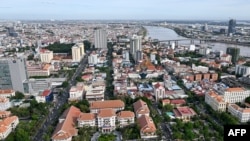Experts tell VOA that Thailand’s deportation last month of six Cambodian activists back to Cambodia shows Bangkok continues to participate in “transnational repression” — coordination among governments targeting dissidents outside their countries.
Authorities deported Pen Chan Sangkream, Hong An, Mean Chanthon, Yin Chanthou, Soeung Khunthea and Vorn Chanratchana last month.
The four women and two men have since been charged by Cambodia with treason for posting social media statements criticizing Cambodian policies over the 20-year-old Cambodia-Laos-Vietnam Development Triangle Area, or CLV-DTA, agreement, which is aimed at easing trade and migration among the three countries, The Associated Press reports.
They are now being held in separate facilities in pre-trial detention in Cambodia, and will face trial for their charges, that could see them sentenced to lengthy time in prison, according to Radio Free Asia.
The six activists are supporters of the banned opposition Cambodia National Rescue Party and had left Cambodia for Thailand in 2022.
Tiy Chung, a regional spokesperson for the U.N. High Commissioner for Refugees, or UNHCR, confirmed to VOA by email that the six have been deported and “are people of concern.”
UNHCR, he said, is “deeply concerned” by the deportation, which included a child, he said, and which goes against Thailand’s obligation to ensure that no one is expelled or returned to someplace where their life or freedom could be at risk.
“We are seeking urgent clarification from the Thai authorities on the circumstances surrounding this deportation and urge them to honour Thai law and their international obligations to prevent such actions in the future,” he wrote.
In recent years the Cambodian government has cracked down critics in and out of the country.
Planned protests against the CLV-DTA agreement saw September arrests of at least 100 activists, who accused Phnom Penh of ceding Cambodian territory, although the same month saw Cambodian Prime Minister Hun Manet announce Cambodia would pull out of the decades-old deal.
In February, three other Cambodian activists, recognized as persons of concern by the UNHCR, and their families, were arrested in Thailand before they had planned to protest Manet’s visit to Thailand.
The practice of transnational repression is not new.
Freedom House said in 2022 that since 2014, over 150 people in Thailand had been victims of the practice.
Phil Robertson, director of Asia Human Rights Labor Advocates, said Thailand is not safe for Cambodian refugees.
“The message here to all Cambodian refugees sheltering in Thailand is you’re not safe because the friendship between the Hun and Shinawatra families trumps any obligations Thailand is supposed to uphold under international human rights law,” he said.
Cambodia has been ruled by the Cambodian People’s Party for 45 years, with critics saying in recent years the regime has stepped up efforts to target dissidents, opposition parties and independent media who pose threats to its reputation or rule. Hun Manet took power in 2023, succeeding his father, Hun Sen, who led Cambodia for nearly four decades.
Thailand and Cambodia have endured an up-and-down relationship over the years, with border and cultural conflicts periodically being divisive.
Those relations appear currently to be close, in part because of family ties. Thai prime minister Paetongtarn Shinawatra met Manet in Laos in October. But it is the relationship between their fathers and predecessors, Thaksin Shinawatra and Hun Sen, that has cemented strong ties between the two families.
Thailand’s ruling Pheu Thai party has vowed to work together on transnational crime with Manet.
Thitinan Pongsudhirak, a political analyst in Thailand, told VOA the family links are likely key in this deportation case.
“The close personal relations and even family ties between the two families make this deportation suspect. It will be difficult not to conclude that these intimate links facilitated it. The deportation is an ill-considered move for the Paetongtarn leadership and government that claims democratic legitimacy despite coming second in the May 2023 election,” he told VOA.
The purported treasonous crimes that six Cambodians allegedly committed fall under Article 453 of Cambodia's criminal code. If found guilty, the criticism of the Cambodian regime and its policies toward neighbors Vietnam and Laos could land them a decade in prison.
Thailand has its own strict laws it implements for those who are critical of its monarchy. Under Article 112 of its criminal code, it is illegal to criticize the Thai monarchy, carrying sentences of 15 years in prison for each offense.
In January, a 30-year-old man was sentenced to 50 years in jail after being ruled to have defamed the monarchy.
Prem Singh Gill, visiting fellow in Universitas Muhammadiyah Yogyakarta, Indonesia, says the Thai and Cambodian governments share similar interests when it comes to prohibiting dissent.
“This collaborative approach is not coincidental but strategically designed. Both countries share similar authoritarian impulses, with royal institutions and political elites working in concert to maintain their grip on power. By harmonizing their approach to dissent, Thailand and Cambodia create a more comprehensive mechanism of controlling political discourse,” Gill told VOA via email.
“Transnational repression becomes a sophisticated tool of regional authoritarianism, where activists find themselves trapped in a network of legal and extra-legal threats. Governments collaborate through informal channels, sharing intelligence, coordinating deportations, and creating an environment of constant vulnerability for political dissidents,” he added.
Thailand recently was elected to a seat at the U.N. Human Rights Council and is expected to begin its duties in January 2025.
VOA contacted Thailand’s Foreign Affairs Ministry for comment but received no response.





